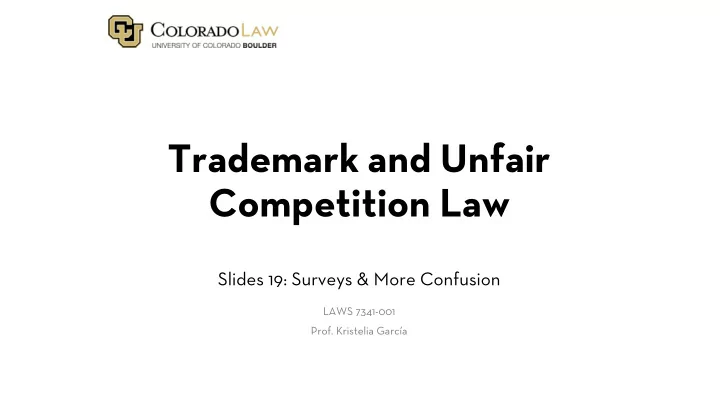

Trademark and Unfair Competition Law Slides 19: Surveys & More Confusion LAWS 7341-001 Prof. Kristelia García
Class Outline • Consumer Surveys For/Against Confusion • Different Types of Confusion: • Palming/Passing Off • Sponsorship • Reverse Sponsorship/Passing Off • Point of Sale • Initial Interest • Post Sale 2
3
“Proof of actual confusion is considered the best evidence of likelihood of confusion.” – Smith v. Wal-Mart (2008) 4
Trustworthy Survey Criteria 1. The ‘universe’ was properly defined, 2. A representative sample of that universe was selected, 3. The questions to be asked of interviewees were framed in a clear, precise and non-leading manner, 4. Sound interview procedures were followed by competent interviewers who had no knowledge of the litigation or the purpose for which the survey was conducted, 5. The data gathered was adequately reported, 6. The data was analyzed in accordance with accepted statistical principles, and 7. Objectivity of the entire process was assured. 5
Types of Confusion 1. Palming (/Passing) Off: Confusion over source or origin between directly competing goods 2. Sponsorship: Among unrelated goods, where the similarity of TM erroneously suggests a connection between the sources – usually a junior user seeking to profit from senior user’s goodwill 3. Reverse… 1. …Reverse Sponsorship: Like regular sponsorship (unrelated goods), but where larger junior user overwhelms smaller senior user causing senior user to lose value of its TM 2. …Reverse Passing Off: The same concept in the context of competing goods 6
“Passing Off” (aka “Palming Off”) When a producer misrepresents his own goods or services as someone else’s. 7
“Reverse Passing Off” When a producer misrepresents someone else’s goods as his own. Bob’s 8
Hmmm, these goods DEF PLAINTIFF come from plaintiff The usual case – regular or “forward” likelihood of confusion Hmm, these goods come from DEFENDANT PL defendant Reverse likelihood of confusion 9
Alleged Harms of “Reverse” Confusion • Loss of the value of the trademark • Product identity • Corporate identity • Control over goodwill and reputation • Ability to move into new markets • Consumers seeking defendant’s goods at plaintiff’s outlets get angry at plaintiff • Being thought an infringer? 10
What’s the difference? REVERSE LIKELIHOOD OF REVERSE PASSING OFF CONFUSION • Junior user is using senior • Junior user is using his own user’s mark mark • Junior user manufactured • Junior user is selling a the products that he is product “made” by the selling senior user – physically or “intellectually” • Junior use is big company • Size of junior user is with deep pockets irrelevant • Involves 2 trademarks • Involves 1 trademark 11
Actual/ “Point-of-Sale” Confusion When a customer is misled, up to point of purchase, as to the source of manufacture of the product. 12
Initial Interest Confusion • When a manufacturer improperly uses a trademark to create initial interest in the product, even if the customer realizes, prior to purchase, that the product was not actually manufactured by the trademark holder. • Applies when allegedly improper use of a trademark attracts potential purchasers to consider products or services provided by the infringer. 13
Post Sale Confusion • When use of a trademark leads individuals (other than the purchaser) mistakenly to believe that a product was manufactured by the trademark-holder. • Applies when allegedly improper use of protected trade dress on a lower-quality product diminishes the reputation of the holder of the rights to that trade dress. 14
Post sale confusion requires an inferior product Roberts kit on a Pontiac Fiero…or is it a 1972 Ferrari Daytona Spyder?? 15
Initial Interest Confusion v. Post-Sale Confusion INITIAL INTEREST CONFUSION POST-SALE CONFUSION • Similarity of mark attracts • Consumer knows goods consumer attention are not genuine • Confusion is dissipated • Third parties think the item before purchase was made by the TM owner • What’s the harm? • What’s the harm? 16
Dastar Corp. v. Twentieth Century Fox 17
18
19
20
21
22
23
24
Recommend
More recommend